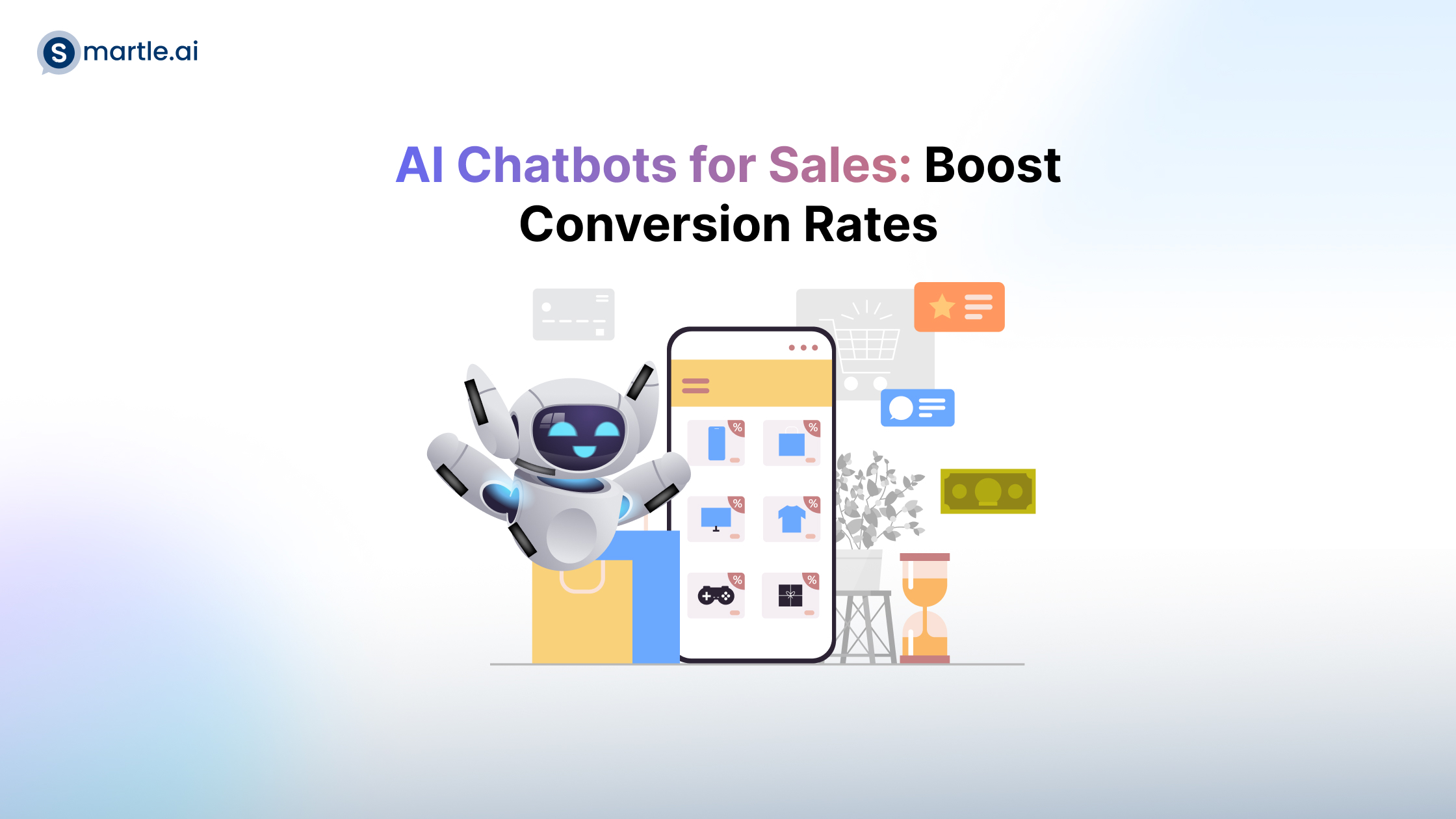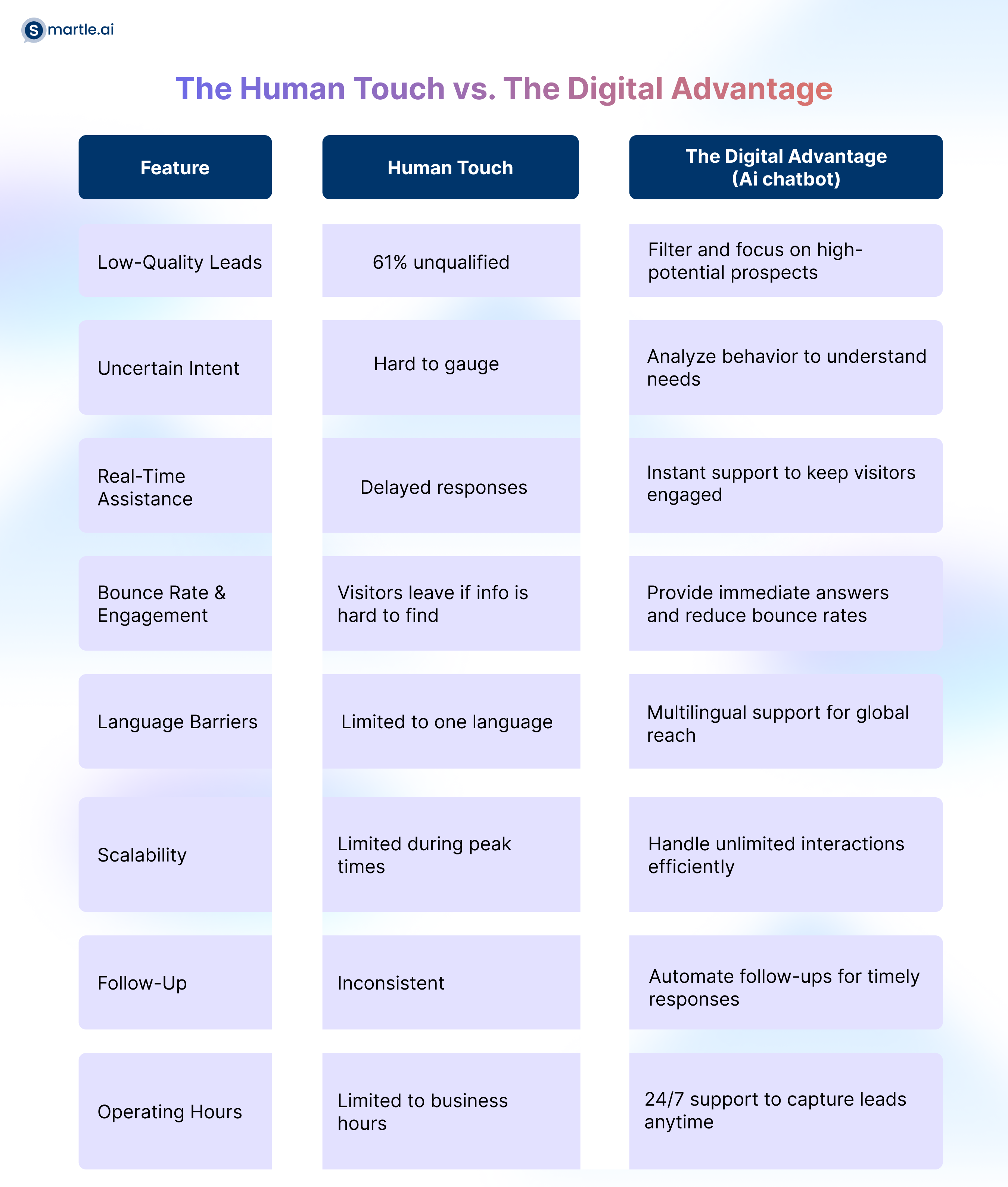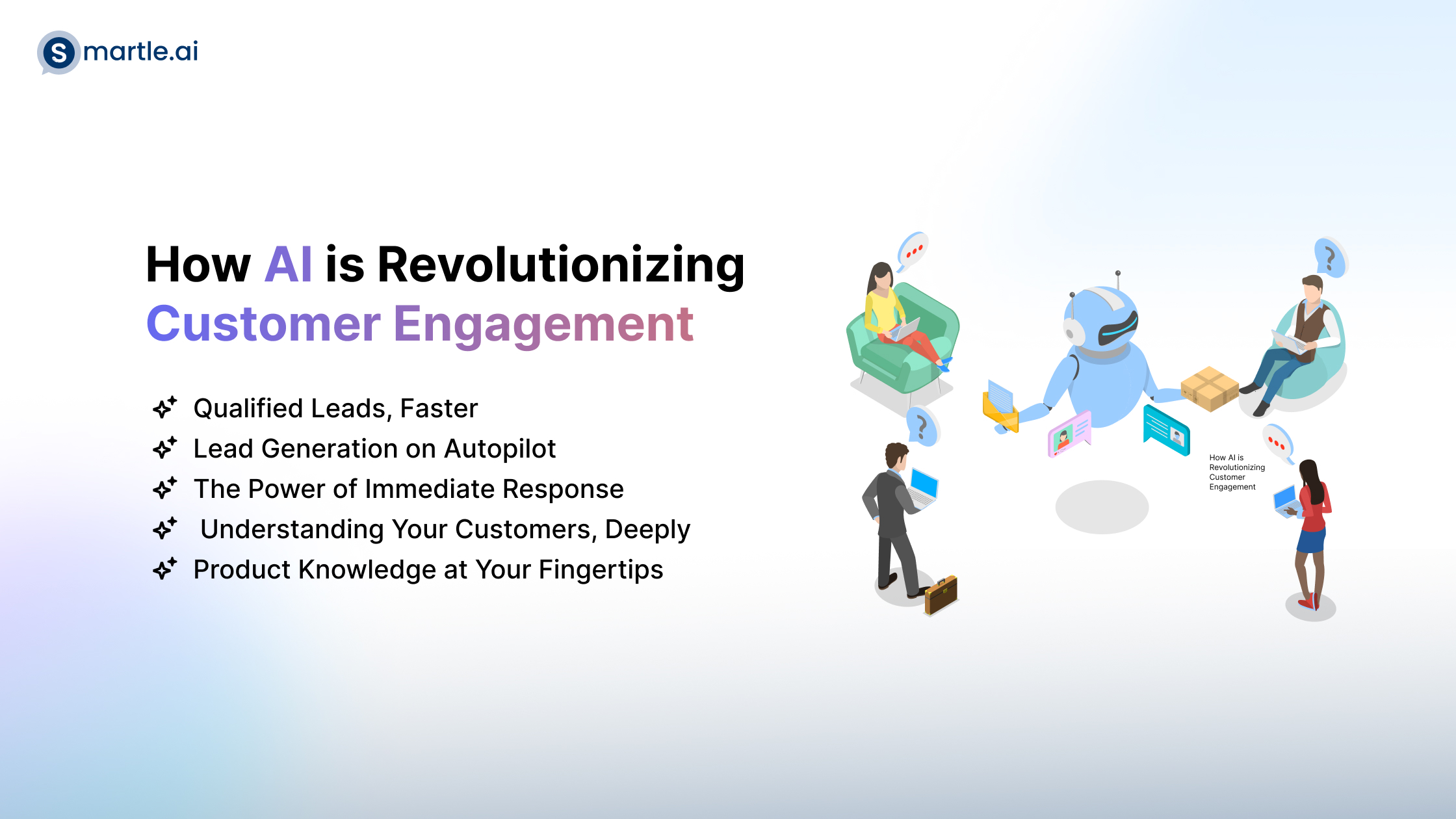AI Chatbots: The Conversion Catalysts Marketers Desire
AI chatbots aren’t just tools; they’re the secret weapon marketers, sales gurus, and digital wizards are wielding to transform visitors into customers. These digital conversation starters are proving to be game-changers, delivering astonishing results in engagement and sales. Let’s uncover how these AI-powered assistants are rewriting the rules of conversion.
Lead generation is a formidable challenge for 61% of marketers, consuming over half of marketing budgets. Despite the relentless pursuit of traffic, converting visitors into leads remains a persistent hurdle. Marketers grapple with identifying visitor intent and nurturing prospects, while sales teams struggle to respond promptly and schedule meetings efficiently.
Enter the chatbot, a digital superhero with the power to transform your sales game. These AI-powered conversationalists are redefining customer interactions, building trust, and driving conversions like never before. In fact, businesses using chatbots have seen a staggering increase in high-quality leads.
The impact is undeniable: The numbers speak for themselves. Chatbots can boost website conversions by a mind-boggling 10 to 100%. Sales teams are reaping the rewards too, with a 67% increase in sales attributed to chatbot interactions. It’s no wonder that a quarter of all sales now originate from these digital conversations.
Ready to unlock the full potential of chatbots? Let’s dive into how forward-thinking marketers,sales .

Overcoming Challenges in Converting Visitors to Customers with AI Chatbots
The Human Touch vs. The Digital Advantage
For decades, businesses have relied on the power of human interaction to build relationships and drive sales. Phone calls, emails and face-to-face meetings have been the cornerstones of lead management. While these methods excel at building rapport and trust, they also present inherent limitations. In today’s fast-paced digital world, the human-centric approach often falls short in meeting customer expectations and driving optimal results.
Here are some of the common challenges and how AI chatbots can address them:
1.Low-Quality Incoming Leads :
Sales teams often waste valuable time sifting through irrelevant leads, as 61% of B2B marketers send all leads directly to sales, with only 27% being qualified. AI chatbots can efficiently handle initial inquiries, filter out low-quality leads, and allow sales experts to focus on engaging with high-potential prospects.
2.Uncertain User Intent :
Visitors come to business websites with diverse intentions, from casual browsing to urgent purchasing needs. Determining these intentions can be challenging. AI chatbots analyze visitor behavior and interactions to better understand and respond to each user’s needs, ensuring a more personalized experience.
3.Inability to Provide Real-Time Assistance
Immediate support is crucial, as 80% of consumers expect quick responses, and 78% are likely to buy from the first company that replies. Without real-time assistance, visitors may leave frustrated. AI chatbots offer instant answers and support, keeping visitors engaged and more likely to convert.
4.High Bounce Rate & Low Website Engagement
Visitors who can’t find what they need, such as schedules, contact details, or product information, are likely to leave and turn to competitors. AI chatbots provide instant answers to questions, reducing bounce rates and increasing engagement by encouraging visitors to stay and take desired actions.
5.Multilingual Barriers
Language can be a significant barrier when selling products or services globally. AI chatbots, equipped with multilingual capabilities, break down these barriers, facilitating seamless communication with visitors from different linguistic backgrounds.
6.Scalability Issues
Traditional customer service methods struggle to scale efficiently, especially during peak times or as a business grows. AI chatbots can handle an unlimited number of interactions simultaneously, ensuring consistent and high-quality support regardless of traffic volume.
7.Inconsistent Follow-Up
Human sales teams may struggle with consistent and timely follow-ups due to workload or human error. AI chatbots can automate follow-up processes, ensuring that no lead is left unattended and increasing the chances of conversion.
8.Limited Operating Hours
Human agents can only work so many hours a day, leading to missed opportunities outside of business hours. AI chatbots provide 24/7 support, capturing leads and assisting customers around the clock, ensuring no visitor goes unaddressed.

Integrating AI chatbots into your lead management strategy can effectively address these challenges. By filtering leads, understanding user intent, providing real-time assistance, increasing engagement, overcoming language barriers, scaling support, ensuring consistent follow-up, and offering 24/7 availability, AI chatbots enhance the overall customer experience and drive higher conversion rates.
Chatbots have undergone a remarkable transformation. Once limited to scripted responses, they’ve evolved into sophisticated conversational partners. Today’s AI-powered chatbots can understand and respond to human language with surprising nuance, making interactions feel more natural and engaging.
But how does this newfound intelligence translate to business success? The answer lies in conversion rates. Studies show that AI chatbots can significantly boost conversions.
For example,
- Glassix found that these virtual assistants can enhance conversions by 23%, resolve issues 18% faster, and boast a successful resolution rate of 71%.
- Take Sephora, a beauty retailer, as a prime example. Their chatbot has been a game-changer, driving an impressive 11% increase in conversions.
- Customers can now virtually try on shades, book makeup appointments, and receive expert beauty advice from a robotic assistant named KikBot.
Other industries are also reaping the benefits. For instance,
- H&M’s chatbot helps customers find the perfect outfit by suggesting styles based on preferences and available sizes.
- Meanwhile, Domino’s Pizza has leveraged chatbots to streamline ordering, allowing customers to place orders, track deliveries, and even customize their pizzas through conversational interactions.
These examples highlight the versatility of chatbots across different industries.
By understanding customer needs, providing efficient solutions, and creating engaging experiences, chatbots are becoming indispensable tools for driving conversions and building customer loyalty.
Unleashing the Power of Chatbots: How AI is Revolutionizing Customer Engagement
The digital landscape is a battlefield, and your website is your frontline. Attracting visitors is crucial, but converting them into loyal customers is where success truly lies.
Enter the game-changer – AI-powered chatbots. These intelligent virtual assistants are transforming customer engagement, streamlining sales processes, and boosting conversion rates.
Let’s delve into the arsenal of benefits chatbots bring to the table:
1. Qualified Leads, Faster:
Your website might be buzzing with visitors, but are they all potential buyers? Here’s where chatbots shine. They engage visitors in conversations, asking targeted questions to assess their buying intent and gather valuable data. When someone shows genuine interest, the chatbot seamlessly connects them with the right salesperson, ensuring your team focuses on high-value leads.
2. Lead Generation on Autopilot:
Customers today crave information before committing. Chatbots excel at nurturing these leads, keeping them engaged through informative conversations. KLM Royal Dutch Airlines exemplifies this perfectly. Their chatbot boosted their lead base by a staggering 40% and slashed response times by a whopping 50 times! Chatbots also significantly reduce lead generation costs by streamlining the initial communication, freeing up your human resources for more complex tasks.
3. The Power of Immediate Response:
Our attention spans are shorter than ever, and waiting is a frustration magnet. Chatbots eliminate this pain point by engaging visitors the moment they land on your website. A friendly greeting and a personalized inquiry about their needs set the stage for a positive experience, encouraging exploration and conversion. H&M’s implementation of an AI sales chatbot led to a 15% increase in online sales, thanks to reduced customer wait times.
4. Understanding Your Customers, Deeply:
Personalization is the holy grail of marketing. Chatbots bridge the gap between generic experiences and one-on-one interactions. They analyze customer data and preferences, recommending products or services tailored to their needs. Imagine a visitor receiving personalized recommendations with just a few clicks in a chatbot – that’s the power of AI personalization in action.
5. Product Knowledge at Your Fingertips:
Chatbots are walking encyclopedias. Customers often have questions about products, and chatbots can provide accurate and up-to-date information instantly. Additionally, they can recommend products based on purchase history, opening doors to cross-selling and upselling opportunities.
Beyond these core benefits, chatbots offer a range of additional advantages:
- Overcoming Objections: Chatbots can be trained to address common customer concerns, providing persuasive responses and guiding them towards a purchase decision.
- Closing the Deal: They can summarize product benefits and provide clear calls to action, smoothing the path to conversion.
- Gathering Feedback: Chatbots can gather valuable customer feedback through open-ended questions, helping you improve products, services, and the overall customer experience.
- Scheduling Efficiency: Booking appointments and demos becomes a breeze. Chatbots offer available time slots and streamline confirmation processes, saving both you and your customers valuable time.
The Speed Factor: Imagine converting a website visitor into a lead within minutes, not weeks. Chatbots accelerate lead generation by guiding visitors through a well-designed, engaging journey. Bajaj Auto, recognizing this potential, leveraged a conversational AI for sales. Their chatbot facilitated over 300 hours of customer engagement and led to a remarkable 14.3-fold increase in lead conversions.
The Beauty of Flexibility: Gone are the days of lengthy development cycles. Pre-trained models allow you to deploy chatbots in minutes. Platforms like NoForm.ai offer ready-made solutions that can be customized to fit your unique business needs.

Thus, Chatbots are not just trendy tools, they are strategic assets. By providing immediate support, personalized interactions, and efficient lead generation, chatbots have the power to skyrocket conversion rates, boost customer satisfaction, and streamline operations. With minimal investment, chatbots can deliver a significant ROI, making them a compelling investment for businesses of all sizes.
FAQ’s
1.What is a Chatbot for Sales?
A chatbot for sales is essentially a virtual salesperson. Powered by artificial intelligence and natural language processing, it engages with customers in real-time conversations, answering questions, providing product information, and guiding them towards a purchase. Imagine having a tireless, knowledgeable sales rep available 24/7 to interact with potential customers – that’s the power of a chatbot.
2.How Can Chatbots Boost Sales?
Chatbots are more than just digital assistants; they’re conversion catalysts. By offering personalized recommendations, answering queries promptly, and providing seamless support, chatbots can significantly increase sales. They streamline the buying process, build customer trust, and generate valuable insights into customer behavior.
3.Can Chatbots Really Double Conversion Rates?
While there’s no one-size-fits-all answer, chatbots have demonstrated the potential to dramatically increase conversion rates. By automating routine tasks, providing 24/7 support, and delivering personalized experiences, chatbots can significantly shorten the sales cycle and improve customer satisfaction.
4.Are Chatbots Right for Every Business?
Chatbots can be a valuable asset for a wide range of businesses. However, their effectiveness depends on factors such as industry, target audience, and specific business goals. While they excel in handling routine inquiries and providing product information, complex sales processes may still require human intervention.
5.Which Businesses Can Benefit Most from Chatbots?
E-commerce businesses, online service providers, and those with high customer interaction volumes stand to benefit significantly from chatbots. For example, retailers can use chatbots to suggest products, answer customer queries, and process orders. Financial institutions can employ chatbots for account inquiries, balance checks, and even simple transactions.
6.What Teams Can Leverage Chatbots?
Chatbots are a versatile tool that can be utilized by multiple teams:
- Sales Teams: To qualify leads, provide product information, and schedule appointments.
- Marketing Teams: To engage with customers, collect feedback, and run targeted campaigns.
- Customer Support Teams: To handle routine inquiries, resolve issues, and improve response times.
- Product Teams: To gather user feedback, announce new features, and provide product support.
7.How Can Chatbots Improve Customer Experience?
Chatbots enhance customer experience by offering:
- 24/7 Availability: Customers can get assistance anytime, anywhere.
- Quick Response Times: Issues are resolved promptly, reducing customer frustration.
- Personalized Interactions: Tailored recommendations and offers create a more engaging experience.
- Self-Service Options: Customers can find information and complete tasks independently.
By understanding the capabilities and limitations of chatbots, businesses can effectively leverage this technology to drive sales, improve customer satisfaction, and gain a competitive edge.




